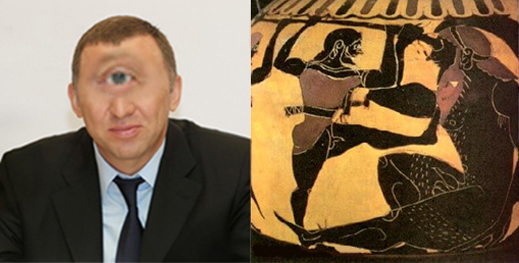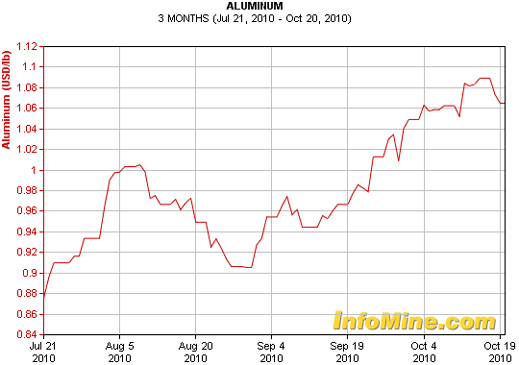
By John Helmer in Moscow
Today the news comes to you from Homer, with Odysseus doing the talking: “We came to the land of the Kyklopes race, arrogant lawless beings who leave their livelihoods to the deathless gods and never use their own hands to sow or plough; yet with no sowing and no ploughing, the crops all grow for them–wheat and barley and grapes that yield wine from ample clusters, swelled by the showers of Zeus. They have no assemblies to debate in, they have no ancestral ordinances; they live in arching caves on the tops of high hills, and the head of each family heeds no other, but makes his own ordinances for wife and children.” The countryside is empty of men, because the Kyklopes (Cyclops) eat them.
It would be saying too much about Oleg Deripaska to assign him Homeric status, especially now that his man-eating days appear to have ended today with a resounding no-vote at the emergency meeting of Norilsk Nickel shareholders which he had summoned. The flash news: international institutional investment funds holding Norilsk Nickel shares voted overwhelmingly against Deripaska’s first-ballot motion to terminate the powers of the Norilsk Nickel board of directors. That panel had been elected at the annual general shareholders meeting on June 28.
Vasily Titov, the board chairman opposed by Rusal, announced that in today’s balloting, 47% of votes were cast against dismissing the old board, and against electing a new one. Just 38% of share votes were cast in favour of Rusal’s motion; 0.4% of shareholders abstained. Titov, elected over Rusal’s opposition on June 28, is also deputy chairman of the management board of VTB; this is the state bank which had been one of the anchor shareholders and state guarantors of the ill-fated Rusal share listing on the Hong Kong Stock Exchange on January 27.
At close of Hong Kong trading today, before the result of the Norilsk Nickel vote was known, Rusal’s share broke a two-month long ascent, and moved down to HK$9.70; that is still 10% below its Kremlin and Rothschild-backed listing price of HK$10.80. During the past eight months of share trading, Rusal has slipped to as low as HK$6.75, 38% below the listing price. Despite the steady rise of the aluminium metal price in the past three months, Rusal’s share price gain has failed to recover to the listing level, while US and Chinese peers, Alcoa and Chalco, have performed more stably in line with the aluminium price:

Allowing that Rusal controlled 25% of today’s Norilsk Nickel vote in line with its stake in the company, the most Deripaska has been able to recruit in his three-month, multi-million dollar campaign was 13% — one vote in eight. Not even the Rothschild apparatus, which was mobilized by father Jacob to protect his son Nathaniel’s standing in Russia, was potent enough to prevent the western investors from giving their thumbs-down.
Rusal’s official statement to media following the defeat was: “The fact that we were not able to secure enough votes will not distract us from the positive agenda which was outlined earlier.” A website posting from Vera Kurochkina, head of press for Rusal, declares: “the voting pattern at the EGM indicates that under Interros’ influence the executive management voted with Treasury shares to prevent minority investors from electing new, independent non-executive directors. This contravenes all established principles of corporate governance.”
Rusal is the last institution left standing outside the Kremlin wall and unable to see that it was not commercial rival Vladimir Potanin who scored the ballot victory, but rather the government, VTB Bank, and the Prime Minister himself, Vladimir Putin. Putin summoned both Potanin and Deripaska to private meetings in Sochi last week; both understood then what the outcome of today’s vote was likely to be.
The reality of Deripaska’s situation is that he now faces a behind-the-scenes decision by Putin and deputy prime minister Igor Sechin, to compel him to sell out of Norilsk Nickel; and allow the Norilsk Nickel share price to recover from the damage inflicted on it by Deripaska’s takeover tactics. When Deripaska contemplates what Sechin is likely to order, he has every reason to fear the Rybolovlev treatment.
Institutional shareholders in London, Boston, and elsewhere, say they were courted by a Rusal roadshow, but concluded that Deripaska is not a credible chief executive or figurehead for the company. They also point to the rulings of the UK High Court in which four of the highest-ranking judges in the British judiciary have ruled that they do not believe Deripaska. Said one investment fund source, who is a Norilsk Nickel shareholder: “Deripaska has been the toxic factor in Rusal’s failure to make a success of its listing in Hong Kong. This toxic factor is also the reason his attempt to take over Norilsk Nickel was bound to be rejected by the international shareholders. The Russian government is slow to get this message.”
Norilsk Nickel chief executive, Vladimir Strzhalkovsky, whose leadership of the defence against Rusal’s takeover has succeeded today, signalled that Deripaska’s time is up. The company will support a buy-out of the Rusal stake, he said after the vote result was announced this evening in Moscow.
That is the first shot to be fired in a campaign that is set to go even further, backed by state officials who believe that new measures must be taken to protect the future value of Rusal from the damage Deripaska’s reputation does to the company.
Today’s vote outcome also embarrasses the Deripaska cheer-squad at the Financial Times and Bloomberg. According to Catherine Belton of the FT, who reported less than 48 hours before the balloting: “foreign institutional investors will play a key role for the first time in deciding the result of a shareholder battle for one of Russia’s biggest companies.” Belton claimed the outcome of their vote “is too close to call.” The only institutional investors the FT could find claimed they were voting for a spill of the current board and for the election of a new one.
Reuters, which has been punished by Rusal for taking an more independent line than Bloomberg, reported ahead of today’s ballot that “Deripaska looks unlikely to convince enough minority investors to join his cause at a shareholders’ meeting Thursday, according to nine out of 12 analysts polled by Reuters.”
Back in the dark of the Cyclops’cave for Homer’s wind-up, here’s how the blinded Polyphemus admits to misjudging his adversary, and tries wheedling Odysseus into returning: “I always thought that the man who came would be tall and handsome, visibly clothed with heroic strength; instead, it has been a puny and strengthless and despicable man who had taken my sight away from me after overpowering me with wine. But come, Odysseus, return to me; let me set before you the presents that befit a guest… So he spoke, but I [Odysseus] answered thus : `Would that I were assured as firmly that I could rob you of life and being and send you down to Hades’ house as I am assured that no one shall heal that eye of yours, not the Earthshaker himself.”











Leave a Reply